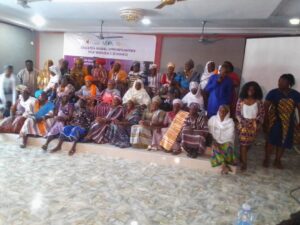Queenmothers urged to lobby for lands for women farmers
 Madam Charity Batuure, the Upper West Regional Director of the Department of Gender, has urged Queenmothers to facilitate the processes and collaborate effectively with traditional rulers to lobby landowners to release fertile lands for women farmers.
Madam Charity Batuure, the Upper West Regional Director of the Department of Gender, has urged Queenmothers to facilitate the processes and collaborate effectively with traditional rulers to lobby landowners to release fertile lands for women farmers.
These lands should serve as land banks for small scale women farmers with land tenure security to encourage more women to go into farming to produce more food to feed their families and for export.
The Queen Mothers should also endeavour to organise small scale women farmers to form cooperatives in the various paramountcies to qualify them to have access to financial support from the banks and other assistance from civil society organisations and agricultural extension services to improve yields.
Madam Batuure made the statement at a day’s dialogue with Queen Mothers on women’s land rights held in Wa to review a Memorandum of Understanding (MOU) signed between the Upper West Regional House of Chiefs and Queen Mothers on land availability and access for women farmers.
The Upper Regional Offices of the Department of Gender organised the forum for 30 Queen Mothers drawn from 32 paramountcies to advocate and lobby landowners for suitable lands for women farmers in the region.
It was on the theme: “Rural women agricultural productivity-The role of the Queen Mothers in Secured land access.”
The Mennonite Economic Development Associates (MEDA), a Canadian nongovernmental Organisation, for “Greater Rural Opportunities for Women” (GROW 2 project) sponsored the forum.
Madam Batuure said active participation and collaboration of the Queen Mothers with the traditional rulers and other local authorities could be able to influence landowners to release large tracts of fertile lands to women farmers to produce food crops to secure food security and enhance livelihoods.
She explained that because women farmers were into smaller groups, they were not considered a force to reckon with and urged the queen mothers to give them a voice through the formation of cooperatives to enable them benefit from pro-poor government’s interventions and other donor support to make them self-reliant.
The Gender Director said currently many women, who had developed the interest in farming, were unable to do so and those of them who had ventured into farming, were provided with unproductive lands, thereby contributing to poor yields and waste of resources and afflicting them with poverty.
“We need to improve women farmers’ yields and income. A farmer is not a farmer without having access to productive and large acreage of land to cultivate his or her crops on.
“Queen Mothers’ involvement in this crusade is great and important, especially lobbying leaders and influencing them to release large acreages of lands to women farmers in the communities is paramount since men alone cannot produce enough to feed the family,” she pointed out
Mr Richmond Bambu Dombo, a Research Officer at the Upper West Regional House of Chiefs, said access to fertile lands had been a thorny challenge for women farmers in the region for so long because ownership of lands was vested in the hands of clans and family lines, which made it difficult for traditional rulers to enforce powers in that regard.
It was not easy for the chiefs to shoulder the issue alone and urged the Queen Mothers, government and civil society organisations to join hands in the struggle to ensure that adequate and productive lands were acquired for women farmers.
Mr Dombo appealed to the Queen Mothers to organise the women into groups and lead them to follow the laydown customary laws to acquire lands for the women farmers rather than allowing individual women to look for lands on their own.
He also advised the Queen Mothers to facilitate the processes with their chiefs and landowners for the establishment of Customary Lands Secretariat to help in land registration for women farmers to get lands from the rightful owners to promote gender security.
Mr Nereus Daguah, a Senior Programme Officer at the Centre for Conflict Transformation and Peace Studies (CECOTAPS), who took the Queen Mothers through a proposed land usage agreement, urged the Queen Mothers to work to sustain peace in the communities to enable women farmers to benefit from the interventions of MEDA.
“First and foremost, let there be peace at all times, and as Queen Mothers, you must serve as a symbol of peace in the communities to enhance sustainable food crop production,” he advised.
A spokesperson of the Queen Mothers, Madam Afisata Salia, the Queen Mother of the Boli Traditional Area, gave the assurance that they would organise meetings with traditional rulers and landowners to dialogue with them to consider women farmers with fertile lands for uninterrupted farming activities.
“We are into competition with our husbands, but our effort is to complement their effort to ensure adequate food is on the table for children and be able to pay their school fees and medical bills”.
Source: GNA
